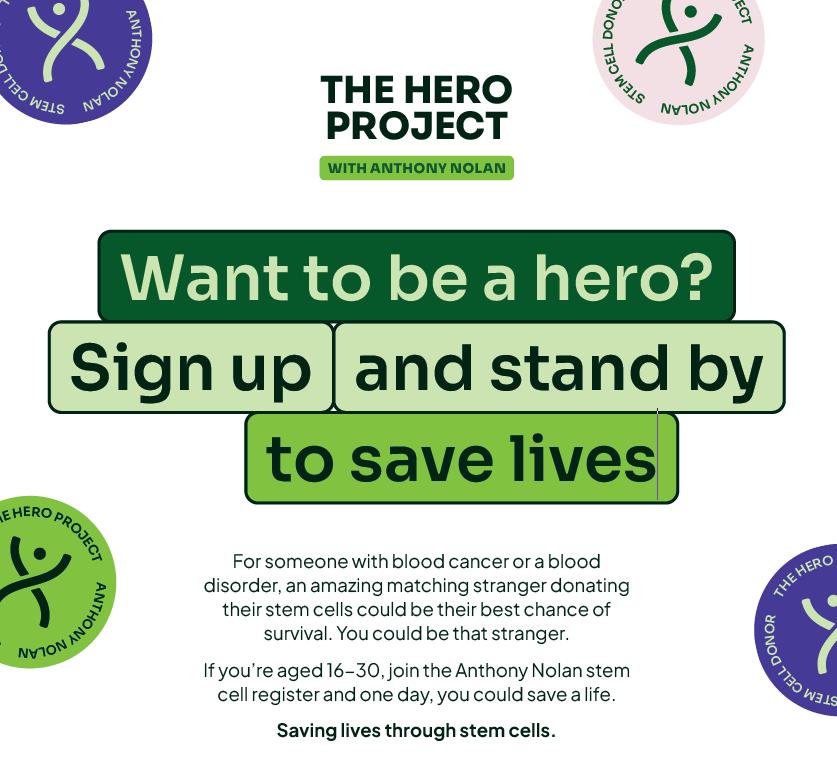

Upper School Bulletin
December 2024
Special Edition: Positive Physical and Mental Health
Niyam (9S1)
Head of Upper School’s message
This publication of the Upper School Bulletin is a Special Edition with a focus on Positive Physical and Mental Health, sharing three messages with our community. The first two serve to triangulate the work we are doing in school with parenting at home and I hope our articles on Sleep and Bigorexia will be informative and well received.
These are two aspects of life that directly impact teenage boys and will be useful for parents to have an understanding of and also for our students to be informed on so that they can develop positive habits and routines essential for human flourishing and wellbeing
The third message is one of Community. I am grateful to Aaryan (11J) who has stepped forward to share a message with the wider Habs community relating to the Hero Project and a close family friend who has recently been diagnosed with a very rare blood condition called Aplastic Anaemia; she needs to find a stem cell donor so that she can have a stem cell transplant. Aaryan’s report in the following pages are a moving read and I am sure will be positively received by our community of readers.
Well done to Niyam (9S1) for his impressive design of our front cover with his painting of the Northern Lights.
Thank you for your positive engagement this term as we look to support, inspire and challenge our Upper School section. Wishing our Year 11 students a purposeful holiday as they prepare for their mock exams in the new year and for all students and families, a very restful holiday. We look forward to welcoming everyone back to school in 2025.
With best wishes,
Mr Adam Lawrence Head of Upper School

Sleep

“Sleep is the best meditation” – Dalai Lama
Supporting teenagers at school and raising my own three children at home, it has become increasingly apparent to me how important and impactful sleep is on children’s physical and mental health, family dynamic and academic progress. Getting it right is not easy but if our children are to succeed and be happy it is a necessity.
I wanted to share some observations from school this term so we can work to improve our children's daily experiences, family dynamics and engagement at school. I have noticed: a not insignificant number of students arriving late in the morning where there have been fallouts at home and teenagers struggling to get out of bed; students nodding off in assembly (and it was a good one!) and teachers reporting concerns over students' tiredness in lessons. We know that disagreements at home impact student wellbeing and engagement at school. For Year 11, an increasing number of students are staying up late or getting up early to factor in revision at the beginning and end of the day.
No blame is attributed to these observations, they are part and parcel of busy families and lives. However, I hope my insights and sharing of information here will be an open reflection on how we can all work together to maximise our children’s potential for enhanced wellbeing and increased success through a crucial look at sleep.
I draw upon a range of sources listed at the end of this article. In particular, I refer to Beth Kerr’s work; Beth hosted a recent Parent Information evening on how we can work together to navigate young people’s use of social media, smartphones and their effects on sleep. Dr Hope Christie from Tooled Up provides an overview of how sleep is a charging station for brains and bodies and how sleep deprivation can impact on all aspects of children and young people’s lives, advising that introducing sleep literacy into family life is key.
Ariel Klein - Case conference
”If you get tired, learn to rest, not to quit” –
1. Why does sleep matter?
• For teens, sleep and mental health go hand in hand. It is a bidirectional relationship, meaning that one will impact the other and vice versa.
• Sleep is critical for teenagers’ thinking and academic achievement, their emotional wellbeing, mental health and body development.
• Good sleep quality can:
- Help our teens make sense of things that have happened to them during the day and when their days are full, varied, energetic and physically exhausting.
- Help our teens rationalise challenging experiences. These might include processing information they have received, digesting world news or navigating friendships.
- Teens who are well-slept retain positive memories over negative ones! We want to optimise the positive ones and for teens to move on from negative experiences without them dwelling on them in so far as is possible.
2. When should we audit sleeping routines?
• If behaviour suddenly deteriorates, anxiety rises, or learning takes a turn for the worse, always audit the quality of your child’s sleep first.
• Have you noticed a change in your child’s behaviour or mood? How have their sleep routines varied recently?
3. How much sleep do teenagers need?
• Tooled Up’s work with The Sleep Project finds that hours of sleep needed varies as children grow and develop. Whilst there are recommended sleep times for each age group, sometimes these guidelines will not work for particular children. For teenagers, if they can manage to get between 8-10 hours, this is ideal, but 7-11 hours could be optimal for others. Numbers are general guidelines and what works for one family might not necessarily work for another.
• If your child is involved in elite sports at a high level, this will require specific coaching and consideration of the individual’s routine and coaches should be consulted here. Ultimately, parents are responsible for daily routines and over committing a teenager beyond their abilities is not in their best interest.

4. How important are daily activities?
• Prioritise physical activity and exposure to natural light during the day. Incorporating both of these can have a significant impact on sleep quality by regulating the body’s natural circadian rhythm. Talk with your child about how they spend their break and lunch times at school. Are they spending a healthy balance of time outside in the daylight alongside being indoors in an activity or club.
• Teenagers reluctant to exercise? Parents can encourage physical activity by walking. Too far to walk? Park further away from a destination and walk the rest of the way.
• Listen to this 6-minute podcast on How to get 60 minutes extra sleep each night through exercise: Dr Caitlin Chasser.
“A well-spent day brings happy sleep.” – Leonardo da Vinci

5. How can we establish good bedtime routines?
Arguments before bed:
• Arguments before bed can be more emotionally arousing and sleep inhibiting that any ‘blue light’ coming from a child’s phone.
• Set and respect quiet hours in the home, establish routines that signal the winding down of the day and engage in evening activities that promote relaxation and readiness for sleep: reading, calming music or taking a warm bath.
Academic work:
• Preparation, preparation, preparation. Organisation is key to staying on top of academic work and deadlines.
• Encourage students to communicate with their teachers if they would benefit from requesting a deadline in advance of it.
• Academic related sanctions also serve as an efficient means of communicating academic concerns as opposed to simply punishing a student for failure to meet an expectation related to academic work. Speak with your child about how they could learn lessons from any given sanction to enhance organisation and quality of homework for next time.
Stimulus control:
• Create a sanctuary dedicated to rest and relaxation.
• Set boundaries for sleep and other activities, a psychological link is strengthened between bedroom and relaxation making transition to sleep smoother and more effective.
• Discourage activities including studying, eating or using electronic devices in this space to maintain its association with restfulness.
Phones before bed:
• What teens are doing on their phone may affect their ability to get to sleep (as opposed to just avoiding ‘blue light’).
• Implement and stick to a no device in bedroom rule for the whole family. Role model this to children to include them in the decision making.
• Set boundaries around screen time, such as turning off all devices at least an hour before bed.
Light:
• Getting the best quality sleep means shutting out the world so you don’t have any interruptions. Then in the mornings, waking up our children with that burst of light that comes with opening the curtains or pulling up those blinds is key. Getting as much natural light as possible during the day will encourage their brain to set their body clock. This can also help to offset the negative effects of artificial light in the evenings.
• Consider black out curtains and eye masks.
Noise:
• Minimise noise.
Routines:
• Letting our teens sleep in at the weekend won’t help in the long run. Binge sleeping at weekends may help to replenish a sleep debt but can also give confusing messages to the brain about when it is time to sleep. Research suggests that keeping a weekday and weekend routine regular avoids a jet lag between weekdays and weekends.
• Set consistent sleep schedules for everyone in the family, including at weekends and during holidays.
Temperature:
• Keep rooms at a reasonably cool temperature, as this too can help improve sleep quality. The Sleep Project suggests the ideal temperature is 16-18 degrees.
Family agreement:
• Talk about sleep care and consider a whole family approach to reducing evening worries.
Sources:
Beth Kerr - Wellbeing
Dr Kathy Weston Wednesday Wisdom | Sweet Dreams | Tooled Up Education
Of course, all of this is unique to each family, work commitments, other siblings, distance from school and individual needs. Understanding, adapting to and creating positive changes that benefit everyone’s sleep and quality of life may bring about positive change. I wonder if small tweaks to daily routine might be beneficial and if there is anything we can do in school to help parents support children at home. We are more than happy to be involved in the discussion around routines, schoolwork and sleep.
Alice Gregory’s ‘Nodding Off’ comes highly recommended for practical advice tailored to adolescents.
Mr Lawrence Head of Upper School

Bigorexia
Mr Lee, Deputy Head of Upper School
Over the last few years, it has become apparent that students are spending more and more time going to the gym and working out. The increase in use of social media and posting images of yourself has led to an increase in teens striving for the ‘perfect body’ which has led to an increase in bigorexia.
Bigorexia – what is it?
Bigorexia, otherwise known as muscle dysmorphia, is a mental health condition where people see their bodies as small and lacking in muscles. People suffering with muscle dysmorphia tend to be considered extremely muscular by others since they are often spending time working out in the gym. Current research shows that 1 in 10 men who attend gyms suffer from ‘bigorexia’ however the number is believed to be greater as there is not much knowledge of the condition Research also suggests that 25% of adolescent males are worried about not having enough muscles
10 Signs and Symptoms
1. Preoccupation with body image, body size or shape, a specific part of the body, and weight
2. Significantly limiting the variety of foods consumed by restricting entire food categories
3. Performing specific rituals around food intake, and having a rigid eating schedule
4. Excessively working out or lifting weights, to the point that it disrupts schoolwork and other activities
5. Counting calories and tracking nutrient content to achieve a “perfect” formula
6. Avoiding social gatherings or eating out due to perceived lack of control over food content
7. Excessively checking mirrors or other reflective surfaces or avoiding mirrors
8. Staying away from social situations where bodies may be on display, such as the beach or pool
9. Wearing multiple layers of clothing to appear more muscular
10. Using anabolic steroids or other appearance and performance-enhancing drugs

Bigorexia and Social Media
Social media has played a massive role in the increasing number of cases of bigorexia. The photographic nature of Instagram and snapchat reinforces body image sensitivity. Studies have shown that the most frequently depicted male body type on social media is lean and muscular. The introduction of image generatingAI is only compounding the issue as teens strive for the perfect body type. A study of action figures over the last 30 years has also shown that they have grown more muscular over time. Before and after pictures are constantly being shared on social media giving the impression that the ideal body shape is achievable through exercise and diet. One piece of research showed that a 50% reduction in social media screen time had a significant improvement on how teens felt about their bodies.
What can parents do to protect against Bigorexia
1. Look for signs of bullying
The long-term effects of bullying can include self-esteem issues, eating disorders, bigorexia and many other mental health conditions so it is important to look out for any signs of bullying.
2. Limit social media
Setting firm boundaries around social media usage can have a significant positive effect on a teen's mental health and help prevent against bigorexia.
3. Educate your teens
Speaking to your teens about body dissatisfaction and how common it actually is will help teens realise that they are not alone in feeling this way. Explain how social media can have an adverse effect on the way they might feel about themselves.
4. Listen to them
Talk to your teens and listen to how they feel about their own bodies and masculinity.
Useful Links
Muscle Dysmorphia: Risk Factors, Treatment, Outlook (healthline.com)
What is bigorexia – NYT article
Muscle Dysmorphia - BBC
Community
The Hero Project
By Aaryan (11J)
Hi, my name's Aaryan and I'm currently studying for my GCSEs in year 11. Unfortunately, a very close family friend of ours has recently been diagnosed with a very rare blood condition called Aplastic Anaemia and she needs to find a stem cell donor so that she can have a stem cell transplant. This is the only cure for this condition. Amilah is 9 years old, and I have known her my whole life as our families spend a lot of time together In fact, she is more of a cousin Amilah has always been a kind and energetic girl, and I feel so sad when I think of how sick she may become This is why I want to raise awareness about stem cell donation and how important it is to consider signing up to the register I really hope that the Habs community as well as the wider community can all pull together to help save lives not just Amilah's but many others. I didn't have much of an idea about stem cell donation before all this happened and the thought of being a possible donor never crossed my mind. I really hope that Amilah's campaign gives more people an idea of stem cell donation and what it means. Please take the time to read her story and help if you can:
https://www.anthonynolan.org/help-save-a-life/patientappeals/current-appeals/amilah-means-hope


CALENDAR DATES
START OF TERM MONDAY 13 JANUARY
MONDAY 13 - THURSDAY 23 JANUARY Y11 MOCK EXAMINATIONS
TUESDAY 21 JANUARY
Y9 PARENTS EVENING
FRIDAY 24 JANUARY
Y9 GCSE OPTIONS DEADLINE
WEDNESDAY 5 FEBRUARY
Y11 MOCK EXAMINATIONS RESULTS PUBLISHED
MONDAY 10 FEBRUARY
Y11 PARENTS EVENING
HALF TERM MONDAY 17 – FRIDAY 21 FEBRUARY
TUESDAY 4 MARCH Y10 & Y11 CAREERS CONVENTION
FRIDAY 7 MARCH
FIELD DAY
MONDAY 10 MARCH
Y10 ELEVATE – MASTERING YOUR MEMORY
END OF TERM – FRIDAY 4 APRIL
For further information, please refer to the school calendar on Firefly.
